Smart Water Meters
Request a call back from our business water experts
Just enter your business postcode…
Request a call back from our business water experts
Just enter your business postcode…
Most people are familiar with smart energy meters for electricity and gas, which the UK government has legislated for a nationwide roll-out as part of its move to a flexible energy grid.
Less well-known is that the same technology is also being used to help reduce the environmental impact of the water industry.
This guide explains everything you need to know about smart water meters, including:
A smart water meter measures water flow from the mains into a home or business property that uses water and transmits this consumption data as frequently as every 15 minutes.
A smart meter allows you and your water supplier to automatically monitor water consumption, allowing for fast leak detection and helping people to use water more efficiently.
Smart meters work alongside the mechanical ‘dumb’ water meters already used across the water network.
A water meter uses a spinning mechanism inside the water pipe. A single rotation of the mechanism represents a specific volume of water passing through the pipe.
A smart meter detects the number of rotations and transmits this information using either:
Your local water company or your business water supplier automatically receives the transmitted data.
Here are the five key benefits of installing a smart water meter at your property:

Smart water meters can provide larger businesses with hour-by-hour water consumption data for environmental reporting. Find out more on our water logger data insights page.
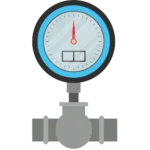
The British water industry is beginning to trial rising block tariffs, which use smart water meter data to encourage responsible water consumption. A smart water meter enables access to these innovative tariffs.
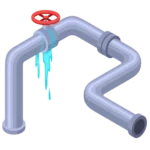
Commercial water leaks are hugely expensive if they go unnoticed. A smart water meter allows your water company to detect when there is a continuous flow of water into your property over 48 hours – a sure sign of a leak.
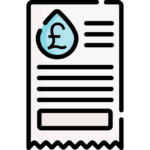
Without a smart water meter, your supplier will only take a meter reading once every six months. This leads to lots of estimated charges on domestic and business water bills. A smart water meter helps you avoid any nasty surprises.

A smart water meter lets you analyse your daily water consumption. You’ll be able to see the positive effects of simple actions like turning off the taps while washing up.
Request a call back from our business water experts
The current state of the British water infrastructure is far from smart. The roll-out of smart meters is part of a broader plan to bring the water network into the 21st century.
Each day in the UK, 20 billion litres of water are extracted from rivers, streams and aquifers and treated for human use.
The treated water travels across a vast pipe network to reach homes and businesses nationwide. The water regulator Ofwat estimates that around a fifth of water is lost to leakage before it reaches homes and businesses.
But this is only an estimate – many homes and businesses don’t even have an old-fashioned water meter, meaning no one knows how much water is being used (or wasted through leakage).
Leaking billions of litres of water comes at a considerable cost in exacerbating water scarcity, a growing problem in our warming climate.
Additionally, the cost of wasting water through leakage means higher water bills for everyone.
With smart water meters at all homes and businesses, we would know exactly how and where water is being used and where it is not reaching its destination. The parts of the water network causing the massive water loss could be identified and fixed. Even better, new leaks that do occur could be detected within minutes and quickly fixed.
Smart water meters are typically found beneath the pavement outside your property, under a cover like this:

A smart water meter is attached to your communication water pipe beneath this cover.
Below is a visual guide for smart water meters that shows the difference between smart water meters and older types of meter.
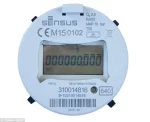
A large portion of the Thames Basin suffers from water scarcity. Here’s an example of a smart meter being used by Thames Water.

Here’s an example of a smart water meter being rolled out by Severn Trent to homes in Coventry and Warwickshire.

Here’s a typical example of an old-fashioned water meter that requires manual reading using the dials on the front.
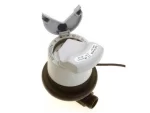
This is a traditional water meter with an AMR device attached. This isn’t a smart meter, but it allows your water company to take a reading from your meter by driving nearby.
The rollout of smart water meters to homes is currently localised to places where water is most scarce.
Here are the water companies that are currently rolling out smart water meters to homes and the regions they are implementing their roll-out:
Some business water suppliers like Water Plus offer smart water meters as an additional service to their customers anywhere in the country.
Unlike the domestic water market, business water suppliers are not automatically rolling out smart water meters to British companies.
Most commercial properties in Britain already have traditional commercial water meters that measure water usage but require manual meter readings.
Our water experts work with a select group of green business water suppliers offering smart water meter installation services to help customers improve water efficiency.
Use our business water comparison service to see how much your business could save by switching to a sustainable business water tariff.
Enter your details at the top of this page to request a call-back from our water experts today.
Let’s answer your frequently asked questions about smart water meters.
Yes. Smart meters communicate their readings using radio waves, just like these other standard devices:
Since smart water meters only transmit the amount of water that has moved through a pipe, the amount of data they send is tiny, especially when you compare them to activities such as cloud gaming.
And, to be clear, the scientific consensus is that radiowaves are entirely non-harmful for people and that all smart meters comply with UK legislation and EU standards (Radio and Telecommunications Terminal Equipment Directive).
It depends on whether the smart water meter is for your home or a business.
For domestic water supplies:
Most homes in Britain currently do not have a water meter (neither smart or dumb), so their water bills are based on the property’s rateable value instead of actual consumption.
If you switch to a smart water meter, your bills will be calculated based on volumetric rates for each cubic metre of water used.
Our water experts have built a water meter calculator to help you determine whether you are likely to save money by upgrading to a water meter.
For commercial water supplies:
The business water rates for companies that upgrade to a smart business water meter are typically unaffected.
Not usually. Generally speaking, the cheapest way to get a smart meter is to upgrade an existing meter with a clip-on wireless device.
When completely new water meters need to be installed, they’ll usually have integrated wireless communications.
Smart water meters only transmit a small amount of data representing the water flow through the pipe leading into your property. This means they only need a small amount of electricity.
The usual solution is a long-life battery that lasts at least ten years without replacement.
If your local water company wants to install a smart meter at your property, it will likely be mandatory (but free of charge).
There is an excellent reason for this: The smart meter roll-out is targeted to protect areas of high water scarcity.
For example, Thames Water started its rollout of smart water meters back in 2014 specifically to reduce the amount of water being extracted from the River Darent – a protected chalk stream that was running dry.